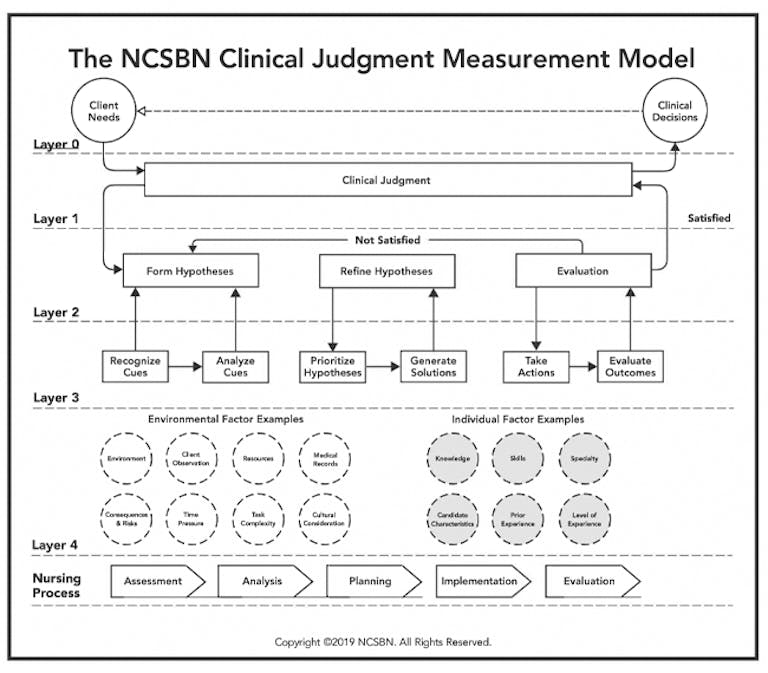
- Blogs
- What Is Clinical Judgment? How To Develop Clinical Judgment For NCLEX?

What Is Clinical Judgment? How To Develop Clinical Judgment For NCLEX?
The Next Generation NCLEX (NGN) is on the horizon, and it will test you on more than just your knowledge. The exam is going to assess your judgment in making clinical decisions. To make clinical decisions, you should be knowledgeable about clinical topics and capable of applying them with proper judgment. So let’s find out what Clinical Judgment is and how you can develop it.
What is Clinical Judgment?

Good clinical judgment helps you determine what data to collect about a client, interpret that data, arrive at a nursing diagnosis, and decide on nursing intervention. It involves problem-solving, decision-making, and critical thinking.
As you practice nursing, with time, you will build a robust clinical judgment for your clients. But even when starting as an entry-level nurse, you need to have some level of clinical judgment skills to provide your clients the best care.
Why is Clinical Judgment important for Next Generation NCLEX?
Nursing involves working in a high stake and fast-paced environment. You will be responsible for collecting accurate information, developing reasoned and knowledgeable action plans, and formulating effective solutions to save lives. Having good clinical judgment will help you perform all these activities properly.
To succeed as a nurse, you must be quick-thinking, self-sufficient, self-aware, and responsible. In addition, strong clinical judgment is essential for Next Generation NCLEX because it will help you deliver safe and effective care.
NCSBN Clinical Judgment Measurement Model:
NCSBN defines clinical judgment as “the result of critical thinking and decision-making. It is an iterative process that uses nursing knowledge to observe and access presenting situations, identify a prioritized client concern, and generate the best possible evidence-based solutions to deliver safe client care.”

The Clinical Judgment Measurement model by NCSBN is a new approach to bedside decision-making. This method helps NCSBN to measure and derive valid inferences around your clinical judgment and decision-making ability as an entry-level nurse.
How to develop Clinical Judgment for Next Generation NCLEX?
The six steps in the NCSBN Clinical Judgment Measurement Model are-
- Recognize Cues: You must recognize relevant information from different sources like medical history, vital signs, etc. You can identify cues by asking yourself these questions:
- What information is relevant/ irrelevant?
- What information is of the most importance?
- What is of immediate concern?
2. Analyze Cues: In this step, you must organize and link the recognized cues to the client’s clinical presentation. Asking yourself these questions can help you perform this step efficiently-
- What client conditions are consistent with the cues?
- Are there cues that support or contraindicate particular conditions?
- Why is a particular cue of concern?
- What other condition would help establish the significance of a cue?
3. Prioritize Hypotheses: You will have to evaluate and rank the hypotheses according to priority based on the urgency, likelihood, risk, difficulty, time, etc., of the condition. Asking yourself these questions can help-
- Which explanations are most/ least likely?
- Which possible explanations are the most serious?
4. Generate Solutions: Here, you will identify the expected outcomes and define a set of interventions to achieve them. Ideally, you should consider multiple potential interventions that connect to the goal. In this step, you may find it helpful to ask the following questions:
- What are the desirable outcomes?
- What interventions can achieve those outcomes?
- What should be avoided?
5. Take Action: You must implement solutions to address the highest priorities in this step. The questions that can help you do this are-
- What intervention or combination of interventions is most appropriate?
- How can the interventions be accomplished/ performed/ requested/ communicated, etc.?
6. Evaluate Outcomes: You have to compare the observed outcomes to the expected ones. Here are some questions you can ask yourself to help you in this step-
- What signs point to Improving/ declining/ unchanged status?
- Were the interventions effective?
- Would other interventions have been more effective?
Additional tips for building up clinical judgment for NGN:

- Analyze and learn from case studies similar to those you will encounter on the Next Generation NCLEX.
- Solve many practice questions specially designed according to the NGN format. It will help you get used to solving questions that require you to practice clinical judgment.
- Take regular practice tests and assess the level of your development. Continuous assessments will help you to refine your clinical reasoning skills, intuition, and knowledge which are the building blocks of clinical judgment. Additionally, it will help you notice improvements and make you feel more confident about your decisions.
You may find these steps tedious at first, but with time and practice, they will become second nature. But, of course, you can’t build your clinical judgment in a day; it takes time, practice, and experience.
By following the above steps consistently, you’ll be able to start thinking critically and making better decisions. Building better clinical judgment will help you ace your Next Generation NCLEX exam and make you a more reliable nurse.